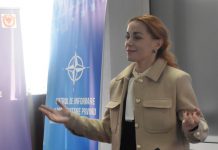At its summit in Bucharest on April 2 to 4, NATO seems to have dropped its long-standing demand for full withdrawal of Russian troops from Moldova and Georgia. The NATO alliance had reiterated that demand at its preceding two summits, in Istanbul in 2004 and Riga in 2006. The communiqués and related statements of those summits had called specifically for a withdrawal” of Russian forces from those two countries, as per Russias obligations under the Treaty on Conventional Forces in Europe (CFE) adapted in 1999.
The Bucharest summits communiqué (Summit Declaration, press release April 3) and related documents no longer mention withdrawal, using circumlocutions instead. The proposals contained in these documents suggest that NATO might tolerate a Russian military presence, albeit a much diminished, one in Georgia and possibly an undiminished one in Moldova. For the past eight years NATO has refused to ratify the CFE Treaty, citing Russias unfulfilled obligations to withdraw its troops from those two countries. At present, however, the NATO allies seem prepared to loosen or break that linkage and proceed with the ratification of the treaty as Russia desires.
Russia ardently seeks international ratification, because the three Baltic states are committed to joining the CFE Treaty upon its entry into force. In that case, limitations could be placed on hypothetical Allied force deployments in the three Baltic states.
NATOs apparent concession stems from three main factors. First, some allies seem worried by Russias unilateral suspension of its compliance with a wide range of CFE treaty obligations since December 2007. These obligations include information exchanges, on-site inspections, and other transparency and confidence-building measures on a reciprocal basis. Moreover, Russia is hinting that it might at some time unilaterally lift the treaty-mandated limitations on its heavy weaponry in certain flank regions. Some European governments therefore urge ratification of the treaty in order for Russia to resume compliance with those core stipulations.
The German government is another factor behind NATOs looming concession. Germany actively leads a group of West European countries that would tolerate Russias retention of the Gudauta base in Georgia and would exempt Russian peacekeepers” from the obligation to withdraw from Moldova. The United States reluctantly seeks to accommodate this position out of concern for allied unity.
The third and most recent factor is a calculation related to Moldova. The Russian troops stationed in that country constitute by far the largest political obstacle to international ratification of the CFE Treaty. Russia evacuated three of its four bases in Georgia in 2007 while retaining a garrison of several hundred at Gudauta (in Abkhaz-administered territory). In Moldovas Transnistria, however, Russia officially deploys 1,500 troops (not including personnel seconded to Transnistria forces) and has not reduced that number in the past five years. Thus, a feeling is taking hold among old” NATO European allies that Russia has more or less fulfilled its obligations regarding Georgia and that Moldova alone is less important than the fate of the CFE treaty and NATO-Russia relations.
Thus, NATOs summit Declaration holds out a compromise, potentially at Moldovas expense. Concerned by recent Russian statements and actions on the Treaty on CFE, indeed deeply concerned that Russia has continued its unilateral ‘suspension [of the reciprocal obligations] . . . we urge Russia to resume implementation.” In return, NATO would proceed together with Russia to implement the Parallel Actions” package that the United States proposed on NATOs behalf in November 2007. The package include[s] steps by NATO allies on ratification of the adapted CFE treaty and by Russia on outstanding commitments related to Georgia and Moldova. We encourage [the] Russian authorities to reach agreement on the basis of the parallel actions package.” That done, the treaty could be ratified, brought into force, and joined by countries that are not signatory to it, an oblique reference to the Baltic states. (Bucharest Summit Declaration, April 3).
NATO had firmed up this joint position ahead of the summit at the North Atlantic Councils (NAC) meeting on March 28. Cautiously welcomed by Russias Ministry of Foreign Affairs (Interfax, April 2), the NACs statement held out to Russia the prospect of ratification of the treaty and accession to it by the Baltic states, under the Parallel Actions proposal, which includes resolution of Russias commitments related to Moldova and Georgia. . . . Upon agreement by NATO and Russia on the Parallel actions package, NATO allies will move forward on ratification of the adapted CFE treaty in parallel with implementation of specific agreed steps by Russia to resolve outstanding issues related to Russian forces/facilities in Moldova and Georgia, as outlined in the package.” In return, NATO expects Russia to end its suspension of compliance with the treatys core military stipulations (NAC Statement, March 28).
The Parallel Actions proposal (see EDM, December 11, 2007) in essence gives up the long-standing linkage between ratification of the CFE Treaty and Russias complete fulfillment of its troop-withdrawal commitments within the 1999 treaty package. The proposal allows the issue of Gudauta to be treated bilaterally between Russia and Georgia. It also makes it easy for Russia to avoid a legal transfer of the base to Georgia in a way that would confirm Georgian sovereignty there.
Under Parallel Actions, NATO would accept a promise of Russian troop withdrawal from Moldova in lieu of actual withdrawal. It only speaks of withdrawal of ammunition (not troops) when possible,” without a time-table and implying through that wording that the withdrawal might be conditional (although the 1999 documents had eliminated any conditionality). The proposal allows Russia to retain peacekeeping” troops in Moldova as part of an internationalized operation; but Russia can be expected to stonewall any such internationalization, undoubtedly cite the lack of agreement on it as an excuse for keeping its troops in Moldova.







